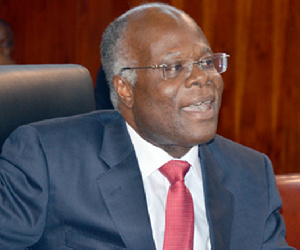Member of Parliament for that Adansi Asokwa Constituency, Hon. K.T Hammond has said that the presence of military personnel in some border towns of the eastern part of the country (Volta, Oti and Upper-West Regions) is due the porosity of the borders.
According to him, this has become necessary because that part of the country could easily see an influx of non-Ghanaians who can come in to vote citing a similar happening in the 2008 General Elections.

“See, there is a classic example. You remember 2008? The second round? We had a hundred thousand or so votes leading Prof. Mills at the time of the second round. The next round one constituency, Ketu- South or so; it cleared all the [votes] we had. Where did they come from? You see, so everybody from whatever, they came to vote. So this is what the whole thing is about. We want there to be sanity” he said.
Read: K.T. Hammond’s ‘Ketu South Togolese’ comment frightening, deeply disturbing – Azar
He insists on the fact that the presence of the military in the part of the country is only to ensure that there was peace, making sure that one votes if he or she is a Ghanaian.
“We want there to be sanity. The military is there to make sure that you vote if you are a Ghanaian. You vote if you have the constitutional right in Ghana to vote. That’s all there is there. They are not electoral officers but they are peace keeping force. They are keeping the peace” he explained.
“I mean come on, let’s be serious. What’s the point in going through all that we’ve gone through to Supreme Court and all that then allow a porous border for people to come through and then infiltrate the register again. We’d have been back to where we started.”
Read Also: Election 2020: Here are the list of centres for voter registration exercise
Reports coming in from some parts of the Volta region today indicates however that indigens of some of these communities that has seen heavy military presence are ready and poised to go out and register when registration commences tomorrow. Presence of the military has also reportedly increased in these areas.
Members of the communities also report that they have had instances of interrogations and military men coming to their homes to interrogate them to find out if they are Ghanaians.




















